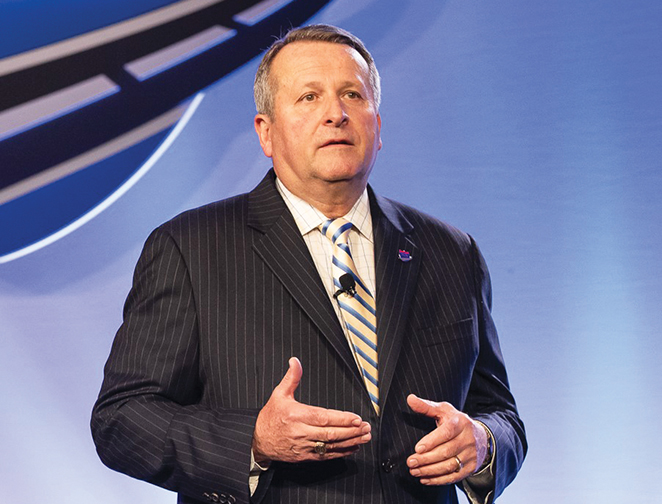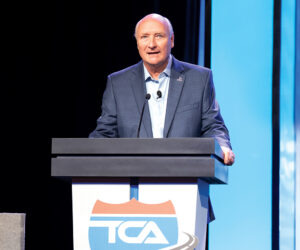In December, John Lyboldt completed five years as president of the Truckload Carriers Association. It has become tradition for the president to discuss the state of the association as it transitions from one year to the next in an interview with Truckload Authority. The following are excerpts from an interview in late January.
On industry issues: some completed in 2020, others carrying over into 2021
Lyboldt hailed the new hours-of-service rule as a success. Implemented on June 1, 2020, the new rule provides professional truck drivers more flexibility in how they operate each day. However, the industry was hoping for even more flexibility in the sleeper berth provision, which can now be split 8/2 or 7/3. FMCSA recently announced a pilot program to study the feasibility of 6/4 or 5/5 splits.
“That could even improve flexibility in our opinion,” noted Lyboldt.
Not pleasing to the industry was the Department of Health and Human Services’ issuance late last year of proposed mandatory guidelines for federal executive workplace drug-testing programs that include guidelines for hair testing.
“When they introduced their decision, we were not happy with it at all,” said Lyboldt of the guidelines, which would require a second type of sample to be drawn along with hair testing. He mentioned other concerns TCA is watching closely and engaged in, such as lawsuit abuse creating nuclear verdicts, minimum insurance, energy and the environment, protecting independent contractors, labor issues, F4A, truck size and weight, and electronic logging device exemption requests.
President Joe Biden
“He’s known as a center-left Democrat,” shared Lyboldt. “I think some of the things that we were expecting are starting to happen with regard to COVID-19 vaccinations and a second round of relief checks.”
Lyboldt also noted that he thinks President Biden will support “closing the gap between the rich and the poor.”
“He does believe in progressive tax with a value-added tax, known as a wealth tax, and with breaks and subsidies for those under the poverty line,” continued Lyboldt. “He is definitely a friend of the trade unions. He is concerned about global warming and the environment and immigration. We will be engaged in conversations on these, as well as federal tax reform, trade, and transportation infrastructure funding to name a few.”
Conference call with incoming deputy secretary of the U.S. DOT
Last November, Lyboldt was invited by American Trucking Associations’ Chris Spear to participate in a conference call with Polly Trottenberg, who was recently named Deputy Secretary of the U.S. Department of Transportation (DOT), and others on President Biden’s transition team.
“The call was very productive,” said Lyboldt. “We shared a great deal of information about our associations’ priorities, concerns, and issues facing the trucking industry. We are looking forward to working with the DOT and FMCSA to address priorities. We are confident that by working together we can accomplish a great deal. We were encouraged, as they really were interested in what we had to say, and with the questions and comments they shared with us.”
What is needed to prop up the Highway Trust Fund?
“We have been talking about how the trucking industry would support a fuel tax increase that would create a huge infusion of funds into the Highway Trust Fund with low administration expense,” said Lyboldt. “President Biden is focused in his first hundred days on COVID-19; however, infrastructure will be front and center, and soon.”
It appears at the time of this writing that a fuel tax increase will continue to be challenged, as the vehicles miles tax is on the table and being discussed. Something must be done because industry stakeholders believe the fund will go broke this year.
“Transportation infrastructure funding is the challenge, as we all know. Finding a sustainable solution now is a must, and the pressure is being felt by many,” said Lyboldt.
Trucking’s response to COVID-19
The COVID-19 pandemic has presented a new set of challenges for truck drivers and the industry, Lyboldt said, adding, “drivers have really stepped up” despite the circumstances.
“They stayed on the front lines and moved the freight that was needed at hospitals, grocery stores, and other service providers,” he shared. “There were so many proud moments where we had truck drivers going down the streets and people were passing out free lunches to them to honor them and show their support.”
Carriers and logistics groups also stepped up to ensure drivers were taken care of throughout the pandemic in many instances, such as when Pennsylvania started closing rest areas.
“Drivers have to have food available to them. You must be able to get fuel and be able to sleep. I’m extremely impressed with the carriers and their logistics groups, their backroom people, the drivers, and everyone with regard to the shippers just keeping the freight moving,” added Lyboldt.
On increasing the strength of TCA programs
As the pandemic has continued throughout 2020 and into 2021, TCA has tackled virtual meetings and program in stride.
“Our educational content and programs, including webinars, our annual meeting, safety meeting, refrigerated meeting, and independent contractor/open deck content, are getting good traction,” shared Lyboldt. “Our webinar attendance has skyrocketed. We used to have 80 people register and 40 actually attend our webinars. Now we have anywhere from 400-700 register for these sessions. We have sponsors for the webinars who have been incredibly supportive so the membership can attend the webinars at no charge.”
In fact, a virtual setting has provided opportunities for growth in TCA’s offerings and added benefits for sponsors.
“What we are finding now is many of the sponsors want to do two, three, or more in one year. It produces good results for them,” he said. “Our virtual ‘Making Safety Happen’ program led by Brian Fielkow just started its second cohort. The Truckload Academy offerings and course completions are growing as well.”
Applications for TCA’s annual scholarships saw notable growth as well.
“When you look at the scholarship success that we had, we had so many more people applying,” said Lyboldt. “It took us by storm, but our judges were able to handle it. We ended up giving out more than 50 scholarships this year.”
Additionally, TCA’s other contest and recognition submissions have skyrocketed.
“Entries to our Driver of the Year, Best Fleets to Drive For, and Fleet Safety Award are off the charts,” noted Lyboldt. “Since October, we’ve honored dozens of drivers as Highway Angels from nominations that are pouring in. Our membership division is doing very well. It’s being led by Zander Gambill, who has just been promoted to vice president. He and his team are having conversations, serious conversations, with people about what we do for them and why we do what we do.”
Government affairs continues to be “the voice of truckload” through TCA’s Zoom meetings with legislators and regulators. The work has been vigorous in TCA’s policy and advisory committees, as the group are focused on its priorities.
TCA’s meetings and events department has had to navigate the pandemic challenges, and has done this very well. “Moving the annual meeting from Nashville to Las Vegas was no small task.” said Lyboldt.
The use of virtual platforms has made a significant difference in TCA’s ability to provide the membership with solutions, information, and vital resources during the most challenging times.
The membership survey has produced a number of initiatives to improve the association’s membership, experience, and value.
“Thank you to all of the members who are working hard on the association’s behalf. Your efforts and contributions have had an impact and have been very helpful,” said Lyboldt.
Buckle up, members. TCA’s staff is poised and ready for yet another exciting year.
Lyndon Finney’s publishing career spans over 55 years beginning with a reporter position with the Southwest Times Record in Fort Smith, Arkansas, in 1965. Since then he’s been a newspaper editor at the Southwest Times Record, served five years as assistant managing editor of the Arkansas Democrat-Gazette in Little Rock and from November 2004 through December 2019 served as editor of The Trucker. Between newspaper jobs he spent 14 years as director of communications at Baptist Health, Arkansas’ largest healthcare system. In addition to his publishing career he served for 46 years as organist at Little Rock’s largest Baptist church.











